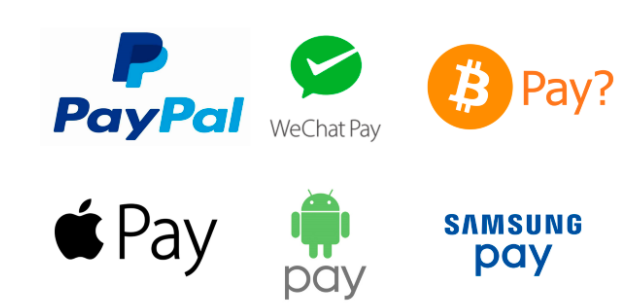Chain Hill Capital: Can cryptocurrencies only exist as payment networks for a long time?
Authorized translation: Carrie | Chain Hill Capital
Original Author: Fernando Ulrich | Austrian School Economist, Brazilian Cryptocurrency Expert
Authorized translation: Carrie | Chain Hill Capital
Original link:
Original link:https://medium.com/
image description

Payment method or digital store of value?
This is the fourth article in this series of articles. There are five articles in this series.
The debate over whether Bitcoin is primarily a store of value or a means of payment has been around since its inception. Although individuals are completely free to use bitcoins solely for payment and for no other purpose, at the end of the day, there are still people who need to hold bitcoins. Because, if no one is willing to hold it, then the value of Bitcoin cannot be maintained. By the same token, cryptocurrencies that are designed solely for medium-of-exchange purposes without regard to scarcity are unsustainable in the long run. Such digital currencies generally adopt some kind of inflationary or uncertain monetary policy, neither of which attracts potential holders.
There are other reasons that prevent "medium-of-exchange-only cryptocurrencies" from becoming popular for long. First, the idea of using one asset as a store of value and another to enable payments negates the basic concept of money. If money is an intermediate commodity that enables transactions, why introduce a second intermediate commodity (i.e., a cryptocurrency that is only a medium of exchange) to increase transaction friction?
Is it wiser to use a single asset to store and transfer value instead of two assets (one for value storage and one for payment)? A brand new asset has price discovery and liquidity hurdles, exchange rate volatility, and incipient network effects issues, all of which lead to higher overall transaction costs. While a cryptocurrency may exhibit low transaction fees and high volume, reducing transaction costs in a narrow sense alone cannot sustain a currency's long-term value.
To illustrate further, let's review the case of international payments. Assuming Bitcoin is the preferred medium of exchange for cross-border transfers, but the sender and recipient are just using it as an instrument currency and don't want to keep it as a cash balance, then someone else has to step in and be willing to keep it. These people play this role because they think Bitcoin is a good (at least potentially) store of value.
But if there is no value proposition (Bitcoin is a good store of value), why would anyone want to hold it? Will others eventually need it as a bridge currency? Would anyone risk holding an asset just because a third party someday wants to use it briefly to transfer value across the globe? Why would anyone risk holding this asset instead of using a payment system that doesn't require other currencies?
These unanswered questions are why saying XRP (Ripple) is inherently nonsensical. It reverses the economics of why you need a commodity and want to hold it as your cash balance. Ripple expects its tokens to be held in demand simply because they can be used as an international money transfer tool, which is actually a reversal of cause and effect. Bitcoin can be used as a vehicle for international transfers because it is a valuable asset that can be held.
This all goes to show that if Bitcoin is to gain traction and adoption, it must stand out as a store of value, not just a payment mechanism, an instrument currency, or a transitory medium of exchange (which can be narrowly understood here as a a commodity that is traded, but individuals do not hold it for longer than necessary for a particular transaction). That said, any other cryptocurrency that competes with Bitcoin will only succeed if it beats it as a store of value, not as a payment network.
Technologists, such as Kyle Samani, managing partner at Multicoin Capital, are biased in their view that Bitcoin is unnecessary to maximize utility as a store of value. Other functions or "utilities" are more important, for which Samani proposes "utility hypothesis"(“utility hypothesis"). I'm not disparaging these features, but I don't think it makes sense to program them into a new cryptocurrency, rather than being baked into a more liquid or established currency. Likewise, if Separate from store-of-value design, then these utilities alone are unlikely to confer long-term value on cryptocurrencies.
suggestion:Chris Paciasuggestion:"Bitcoin's main innovation is peer-to-peer value transfer, not a 'finite supply'."Although this statement makes sense, it ignores a key factor: what is the source of "value" in this value transfer? Essentially, Bitcoin is just a peer-to-peer UTXO transmission system. Value is not within the protocol, but subjectively within each individual, and a limited supply is part of the equation. Without scarcity, there is no value to transfer, and Bitcoin may not have survived in the first place. Therefore, you cannot separate them from each other.
Chris questionedBitcoin is the "sound base currency" argument. He believes that Bitcoin cannot be traded on the chain due to high handling fees, and the second-tier payment network will be "easy to control and manipulate", which will cause Satoshi Nakamoto's invention to fail like the gold standard. “What I want is a currency that is censorship-resistant and unregulated.” He added: “Revalidating the failed gold standard experiment in digital form will not produce different results.” There is some truth to this statement, too. However, again he seems to be missing an important distinction. Gold Standard didn't just fail because of "corrupt middlemen". In fact, it was kicked out of the monetary order precisely because it was sound money and became an obstacle to implementing inflationary policies. Governments are able to do this feat because gold is not censorship resistant.Here's the difference: Bitcoin is not just sound money, it's uncensorable digital sound money.
So, what is or will be Bitcoin Cash? This is not a rhetorical question. Given that Bitcoin Cash proponents abhor transaction fees, they have no choice but to resort to inflation to incentivize miners. Ironically, Bitcoin Cash proponents like Chris, avoiding a new gold standard in digital form, may end up adopting the same inflationary standards as central banks, only this time in digital form.
secondary title
Is it possible that Bitcoin is primarily used for transactions?
What if Bitcoin could never be used primarily as a medium of exchange? What if it becomes a store of value that is rarely used in day-to-day transactions? What if it took longer for liquidity to grow and gain wider acceptance in exchanges? Also, what if the government imposed severe restrictions on everyday commercial use? Will Bitcoin retain any role?
These are important questions that deserve serious consideration. Depending on an individual's view of Bitcoin, the answer may vary widely.
If you, like Bitcoin Cash proponents, see Bitcoin primarily as a medium of exchange (e.g. a payment mechanism), it may become useless if it cannot be used on exchanges in the future. Interestingly, this view is similar to the critique of Bitcoin that some Austrian economists made a few years ago, arguing that it is worthless if it is not a currency. Economist Peter Šurda calls such comments "theThe money-or-waste fallacy". For Bitcoin Cash supporters, the only difference is the time frame: if Bitcoin is not used as a medium of exchange in the future, then it will be worthless. Bitcoin either becomes money (i.e. a medium of exchange in general), or it becomes meaningless.
On the other hand, if you subscribe to the store of value theory, then you realize that purely digital assets have utility in and of themselves. The concept of digital scarcity is powerful and groundbreaking. Even though bitcoin takes longer to gain liquidity and isn't primarily used for transactions, it's still very useful just as a digitized version of gold.
Admittedly, the premise of a practical store of value is that it can be transferred without incurring exorbitant costs or unreasonable delays. However, it does not require instant payment confirmations or extremely low transaction fees. However, it does require secure transfers and payment finality.
So, like gold today, Bitcoin can exist as a store of value. This situation may last longer than enthusiasts expect, possibly decades. Of course, it would be even better if it could gain adoption sooner, improve liquidity, reduce price volatility, and thus be used more as a medium of exchange. However, we cannot deny that confidence takes time to build, and regulation may hinder the use of Bitcoin as "money".
Chris Pacia strongly disagreesThis view, that people holding gold now is not because gold is largely seen as a store of value. Instead, “excessive demand comes from speculators who are betting that new use cases will emerge for gold at some point in the future”. Speculators, such as gold bugs, expect the inevitable currency collapse to return gold to the standard of future monetary systems. But if these "new use cases" don't come to fruition, demand for gold will enter a significant downtrend, Pacia claims.
It is undeniable that some gold beetles do hold this investment logic. However, this group of people is far from the main source of demand for gold. Pacia seems to be ignoring other intrinsic properties that make gold a unique asset in the world. It is a thousand-year-old commodity that is naturally scarce, irreproducible, and universally considered valuable. Gold cannot be overissued, counterfeited or defaulted on. It is no one's liability and has no counterparty risk.
These salient attributes propel gold to the status of the ultimate asset, and all central banks around the world are hoarding it. At the end of the day, each country's monetary authority distrusts its counterparts. Banknotes are a political convention, and even with institutional and constitutional protections, a central bank will not take the risk of allowing its currency to be 100% backed by another country's banknotes, because other countries' banknotes also face unpredictable inflationary pressures.
Fifty-three years after the collapse of the Bretton Woods system, official gold reserves are only 8% lower than in 1971. This is a powerful testament to confidence in gold as a store of value.Supported by a professional team with multicultural backgrounds, members of the core departments - Investment Research Department, Trading Department, and Risk Control Department are all from well-known universities and institutions at home and abroad. They have a solid financial background, excellent investment research capabilities, and a keen sense of the market Sensitive ability, highly awe of the market and risks. The Investment Research Department combines rigorous basic research with mathematical and statistical models to obtain investment strategies such as "Pure Alpha" and "Smart Beta", and will soon export institutional-level research reports and project due diligence reports.
About Chain Hill Capital
Since its establishment in 2017, Chain Hill Capital (Qianfeng Capital) has focused on the value investment of global blockchain projects. It has created early-stage and growth-stage equity investments and encrypted digital asset investment matrices of Alpha Strategy and Beta Strategy. Global resource relationship network, strategic layout of Chicago, New York, Tokyo, Beijing, Shanghai, Shenzhen, Hong Kong, Xiamen and other city nodes. With a wealth of overseas investment institutions and a global high-quality project resource pool, it is an international blockchain venture capital fund.
Supported by a professional team with multicultural backgrounds, members of the core departments - Investment Research Department, Trading Department, and Risk Control Department are all from well-known universities and institutions at home and abroad. They have a solid financial background, excellent investment research capabilities, and a keen sense of the market Sensitive ability, highly awe of the market and risks. The Investment Research Department combines rigorous basic research with mathematical and statistical models to obtain investment strategies such as "Pure Alpha" and "Smart Beta", and will soon export institutional-level research reports and project due diligence reports.



